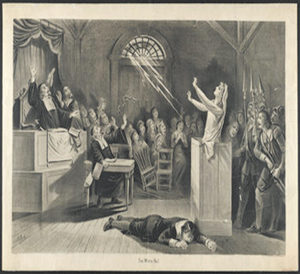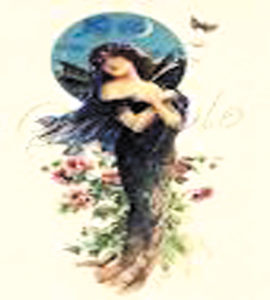 Compiled by Peggy DeStefano
Compiled by Peggy DeStefano The tender-hearted woman, grieving over the loss of her newborn child, was hung as a witch outside of Boston in 1651. She was the second woman to be executed as a witch in Colonial times. This was a few years prior to the infamous Salem witch trials. Our family research claims this woman as one of our ancestors. Her name was Mrs. Henry Lake or Alice Lake.
Already the mother of four, her fifth child died right after childbirth. After her baby died, she imagined her baby came to her in a dream only to comfort her and tell her he was o.k. and she should go on with her life. She told her neighbor, a fellow member of her church about the dream.
The neighbor immediately went to the church elders with the story. The elders believed that it wasn’t her baby who came to her but rather the devil. Because of that, she was accused and convicted of being a witch, and she was executed.
The claim in the town of Dorchester, MA, was that the devil was coming to her in the form of her deceased, beloved child. Records are scant, but they show she had an opportunity to recant her story on the day of her execution and possibly to save her life. She did not recant her story.
Alice said she knew why God was punishing her: She had engaged in sex prior to marriage, became pregnant, and attempted a self-abortion. Never mind that she married the father of her unborn child and had a loving, happy marriage which produced four more children.
At the trial, she was ruled by two strong, womanly pulls — guilt and grief.
In the early part of the 20th century, Alice had a descendant who was a medical doctor who spent many years researching her story and trying to track her descendants. This man described Alice’s story this way: Here is a penitent, broken-hearted, submissive woman, laying bare the greatest secret of her bosom, asking forgiveness; yet the damnable tactics of her fanatical church string her up and hang her in the town square in front of her husband and children and the townspeople.
 Researcher Alice Marie Beard spent a great deal of time trying to figure out Alice’s story.
Researcher Alice Marie Beard spent a great deal of time trying to figure out Alice’s story. The records of her trial are lost; Alice can be seen only in traces and reflections. There is no known re-cord of her from when she still lived. The first the records show she lived was after she was dead, when the townsmen were trying to figure out what to do with Alice’s children since she was dead and her husband had fled. Like most of the women accused of witchcraft, Alice was not well off financially; in today’s world, she and her husband would be described as “poor, working class.” She was a married woman with at least five children, all presumably fathered by her only known husband, Henry Lake. In 1651, those children would have been a girl about ten, a boy about seven, a boy about five, a child about three who likely was a boy, and an infant. Alice’s year of birth is unknown, but because of the ages of her children, she was likely about 30. Like most working class women of the time, she would have worked from sun up until sun down, and likely even after sun down by the light of the hearth fire and by the light of candles she had likely made. She had no conveniences and two little children who would still have been soiling themselves. If she had siblings, parents, or other relatives where she was living, no researcher to date has found them. She carried with her the Puritanical guilt of having had sexual intercourse before marriage, a guilt further complicated because she became pregnant before marriage. Then her youngest baby died.
After her baby died, she told people she saw the baby. Maybe she did. Others who have not been judged insane or witches have claimed to see dead people: Look at the Christian religion. Or, maybe she grieved so much that her mind allowed her to imagine that she saw her baby to ease her grief. Or, maybe she knew she did not see her baby, but claimed she did so as to have something to hold onto. As painful as the death of a loved one is, most recognize a mother’s loss of her baby as a special loss. In Alice’s case, that grief was compounded because — while she had lost her youngest baby to a death she did not want — she knew she had attempted to cause the death of her oldest child by attempting an abortion. [From the earliest comment about this self-attempted abortion, it appears she did not succeed with the abortion.]
The Reverend John Hale had been a young boy when Alice was executed. He went on to graduate from Harvard and became a minister. He supported the witch trials until the witch hunters came after his own pregnant wife, the last woman accused of witchcraft in Salem in Nov. 1692. The Rev. Hale wrote the following in 1697:
“Another that suffered on that account some time after was a Dorchester Woman. And upon the day of her Execution Mr. Thompson Minister at Brantry, and J.P. her former Master took pains with her to bring her to repentance And she utterly denyed her guilt of Witchcraft; yet justifyed God for bringing her to that punishment: For she had when a single woman played the harlot, and being with Child used means to destroy the fruit of her body to conceal her sin & shame, and although she did not effect it, yet she was a Murderer in the sight of God for her endeavours, and showed great penitency for that sin; but owned nothing of the crime laid to her charge.
This woman faced death, and still she would not say she had not seen her dead baby. Perhaps admitting her child had died was more than she could live with, even though her only hope of living was to admit that she knew her baby was dead, and even if she had only pretended to see the baby because her grief was so profound.”
The process of dispersal of the children after being convicted and executed at Dorchester in about 1650 was also found in the local records. Her husband Henry moved away at once; his name appears regularly in the records of Portsmouth, RI, beginning in April 1651. Meanwhile the four Lake children, all less than ten years old, remained in Dorchester. One, probably the youngest, was ‘bound out’ by the town meeting to a local family for a ‘consideration’ of 26 pounds—and was dead within two years. The other three were also placed in (separate) Dorchester households. Three of Alice’s children reached maturity and had children themselves.
At this point their trail becomes badly obscured. (One was living as a servant to an uncle—still in Dorchester—in 1659.) Later, having reached adulthood, the same three were found in Rhode Island — and then in Plymouth Colony, where their father had removed by 1673. It appears, therefore, that the family was eventually reunited, some two decades after the event that had broken it apart.
The book The Early Rhode Island Lakes, published July 1935 in The American Genealogist and New Haven Genealogical Magazine says Henry Lake of Dorchester, Mass., Portsmouth and Warwick, R.I., and Dartmouth, Plymouth Colony who was born about 1610. Died after 21 Feb 1672/73. Married Alice. His wife was one of the earliest victims of witchcraft mania in New England.
“Thomas Lake [Henry & Alice’s son] … was brought up in the family of his uncle, Thomas Lake of Dorchester. He was a soldier under Capt. Benjamin Church in King Philip’s War, as was his brother David. On 1 Nov. 1676, Plymouth Colony granted 100 acres at Puncatest (Tiverton) to David and Thomas Lake for their services in King Philip’s War (see related story on page 17), of which David was to have 60 acres (Plymouth Col. Rec.). This land was afterwards included in the bounds of the Pocasset purchase, with the result that a bitter dispute arose between the Lakes and the Pocasset proprietors.”
The story of Alice Lake reveals the horrors of living in a puritanical community. The fact that her husband moved to Rhode Island after the hanging shows to me that he felt the politics of the Rhode Island colony offered a more accepting community. Eventually the children of Alice Lake converted to Quakerism. Subsequent family members made their way to the territory of Clermont County, Ohio. They had become part of the Knowles family line (Our grandmother’s maiden name was Ruth Georgette Knowles. The Knowles family came through the Case, Spencer, Simmons, Bredwell lines among others.) On census information since their arrival in Ohio they basically put down that their religion was “Protestant.”
Having discovered our witch ancestor and knowing her story makes me feel sorrow for all the women accused of being witches. They were misunderstood and feared by many. A strong woman, an intelligent woman, a feeling woman should be revered.
I’m sure our readers, if given the opportunity, would find ancestors who experienced similar tragedies. I’m glad to know about Alice Lake. She deserves to be honored and not despised. I will be thinking of her on All Souls Day.















Follow Us